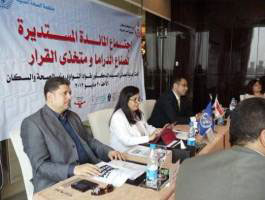 The meeting attracted participants from diverse backgrounds to discuss the role of the media in tobacco use in Egypt. Photo credit: WHO23 May 2012 – WHO and the Egyptian Ministry of Health and Population held a round table discussion on media and tobacco at the Fairmont Hotel in Cairo on 20 May 2012.
The meeting attracted participants from diverse backgrounds to discuss the role of the media in tobacco use in Egypt. Photo credit: WHO23 May 2012 – WHO and the Egyptian Ministry of Health and Population held a round table discussion on media and tobacco at the Fairmont Hotel in Cairo on 20 May 2012.
The discussion attracted 50 participants from diverse backgrounds including prominent script writers, producers, journalists, actors, scientists and media personnel.
A presentation described the country’s current tobacco burden and the widespread direct and indirect marketing of tobacco products.
Participants discussed a study, supported by WHO, that monitored scenes portraying tobacco use in Egyptian drama television series during Ramadan over two years. The negative influence of these portrayals, in particular on youth, were highlighted.
It was agreed that the media has a potentially positive contribution to make to the health and well-being of future generations of Egyptians.
After excellent presentations and rich discussions, a commitment was made to tobacco-free drama by the participants and institutions present.
Specific committments were made by particpants to organize a monthly seminar with the Journalists’ Syndicate to raise awareness among journalists on tobacco control and to host a two-hour satellite television programme on tobacco control and burden and on interventions and policies for improving the health of Egyptians, supported by the director Omar Zahran.
Dr Naeema Al-Gasseer, WHO Representative in Egypt, conveyed WHO’s commitment to support the task force working on a health-related code of conduct for journalists and media personnel and in drafting a law on tobacco-free drama.
The meeting was organized in partnership with the International Union Against Tuberculosis and Lung Disease, Johns Hopkins Bloomberg School of Public Health, Life Without Smoking (Hyah Bela Tadkheen), Fund for Drug Control and Treatment of Addictions (Sandouq Mokafahat wa Elag Aledman walTaaty), and the Egyptian Network for Tobacco Control.



